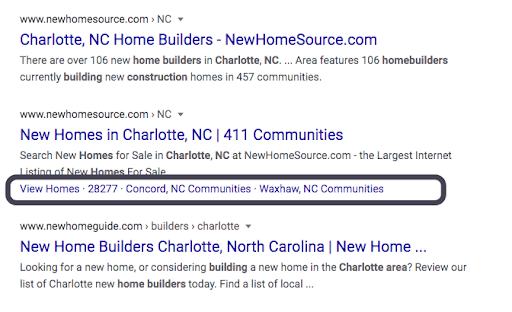One of the most important things your construction company can do to increase lead generation is to market your business where your customers are spending their time. In today’s world, that’s online.
When potential customers begin searching for home builders for their next project, you want your business to come in at the top of the results. A good way to make that happen is through search engine optimization (SEO). That said, building a strong construction company SEO presence doesn’t happen overnight — and it requires a very strategic approach.
Keep reading to learn our top tips for leveraging SEO to help your construction business stand out from the competition.
Why SEO Matters for Home Builders
First, let’s discuss why you should care about SEO as a custom home builder…
You’re proud of the work you do. It’s a shame if potential clients can’t find it. That’s the whole idea behind SEO. Well-developed SEO website pages and content rank highly in search results, ideally on the first page, whenever an organic search is made, which helps make your brand easier to find.
Google’s ranking system is designed to sort through hundreds of web pages of information in order to give the reader the most useful information. If people find your website useful, they will recommend it to others, and organically grow your audience reach. This also helps ensure more qualified traffic is visiting your website.
All in all, with so much competition in the construction industry — particularly within communities that have strong loyalties to their local businesses — improving SEO is crucial to driving more traffic to your website and, in turn, producing more high-quality leads.
Key Website Elements for Establishing Construction SEO
 Just about anything on your website can be optimized to help your site rank in search results. Below are some of the core home construction SEO terms and principles to keep in mind.
Just about anything on your website can be optimized to help your site rank in search results. Below are some of the core home construction SEO terms and principles to keep in mind.
Keywords
Keywords are the words and phrases that a person will search for when looking for your services. The better your company ranks for construction SEO keywords, the more customers you can organically attract.
Research the most popular search terms related to the custom home building industry and build your pages and content around them. While monthly search volume is obviously an important factor, it’s typically easier to rank for lower-volume keywords, which is a good starting point for your keyword strategy.
Use SEO keywords for construction in creative ways in headers, subheadings, and copy, but be sure to not overdo it. Forcing keywords into copy hurts the readability of the page, and Google can penalize your site for it.
URL
The URL is one of the first things a search engine will examine when crawling your page, so it’s essential that they’re structured properly.
Look for pages with auto-generated URLs, normally with random numbers or letters after the forward slash, and replace them with more descriptive language. Be sure to put the keyword or phrase you are going after on that page within the URL.![]()
Tags
Tags are also an important part of the SEO construction industry equation, as they allow your construction company’s website to be found and crawled by search engines. For this reason, it’s crucial to optimize your pages’ header tags, title tags, and meta descriptions with the primary keywords you’re trying to rank for.
The title tag is arguably the most important tag to be familiar with since it gives context to what is on the respective page. Plus, it’s an important ranking factor for Google — the search engine will favor pages with optimized title tags, putting them higher on the search engine results pages (SERPs).
Don’t neglect meta descriptions either. This is the text that shows up underneath the URL in a Google search. Meta descriptions should provide more information about the page and encourage the searcher to click on your link.
Links
There are two main types of links that construction company SEO experts will want to ensure are on your site: internal links and backlinks.
Internal links are links that lead to other pages within your website. You want people to stay on your site as long as possible to show Google that it provides useful information. This not only helps your pages rank higher but gives visitors more opportunities to interact with your brand — and hopefully convert.
On the other hand, a backlink is when another domain links to your website. Think of it as a letter of recommendation to Google. Backlinks tell Google your page is helpful and will help your page rank in a better spot.
The best way to incorporate backlinking into your construction company’s SEO strategy is to find a client or vendor who is open to reciprocal backlinking. Ask your electrical contractor, material supplier, or other industry connection for authentic backlinks to their site in exchange for your company doing the same on your website.
Informative Content
One of the most important pieces to gaining construction industry SEO traction for your website is to regularly post helpful and informative content for your audience. Becoming a trusted source of information is one of the best ways to encourage readers to return to your site on a regular basis.
Providing regularly updated content marketing via blogs, articles, white papers, home builder case studies, webinars, and eBooks all contribute to a strong organic SEO strategy for your construction business.
Multimedia
Enhance your written content with helpful multimedia content like graphics and videos. Why? Google rewards websites and pages with unique content — informative facts and visuals that can’t be found elsewhere.
But keep in mind that search engines can’t see images on websites. Make it a routine to add relevant alt text to every photo uploaded, giving a brief description of what the picture is. That way, Google can “read” the picture and it’ll boost SEO.
Videos are another massively important tool for your SEO construction website. Be sure to use keywords when titling, tagging, and closed-captioning them.
Responsiveness
Another important part of an SEO strategy for construction companies revolves around the design and accessibility of your website.
As of July 2023, mobile accounts for 55.7% of web traffic across the globe. Optimizing your website pages for mobile device users ensures they have a quality user experience when it comes to your site’s design, structure, and page speed.
Plus, you’ll be rewarded by Google if your website has responsive, mobile-friendly pages.
Local SEO for Construction Companies
Roughly 46% of all searches on Google are seeking local information. This includes telephone numbers, hours of operation, and addresses. For custom home builders, especially, it is important that you can be found in your area.
To make sure your local SEO is in good shape, make sure the following aspects are functioning and up-to-date.
Google My Business
This free tool allows businesses to promote their Business Profile and website on Google Search and Maps. Since Google processes over 8.5 billion searches per day, leveraging this platform is an important part of any SEO strategy.
It’s important to maintain consistency for contact information, including location and hours of operation, across the board. Data that is out-of-date can cause the wrong information to be listed in a search.
To make sure your information is updated across all local listings, many enlist the help of a local SEO construction directory management service such as Moz Local or Yext to eliminate any inconsistencies.
Google Reviews
Reviews do more than just build trust with your target audience — they build trust with Google too.
Google Reviews, particularly those that note the location, will also help boost your company’s credibility. Google algorithms determine rank based on the credibility of a review, including the relevance and distance of location to the searcher’s location.
Additionally, responding to reviews signals to Google that your organization is actively working to respond to customers. The reward? Higher SEO rankings over time.
Local Landing Pages
To rank for local terms, you need to include local keywords in your targeting efforts. Do keyword research on terms in your specific area or city, and create a landing page to target these keywords in the metadata, page title, heading tags, image alt text, and on-site content.
Then, focus on building links from local directory listings to strengthen the location-based keywords.
Schema Markup
Schema are brief snippets of data that can give out extra information to users and search engines. This is inserted through Schema.org, which is a collaboration from Google, Bing, and Yahoo and does not require any extra coding.
The image below shows what this additional information can look like in search results.
Paid Ads
While SEO generally involves organic traffic — that is, users who find your site naturally through relevant search terms — construction companies can also utilize paid search to get their website listing placed higher in the SERPs.
Google Ads are paid online advertisements that appear near relevant searches and other content across the web. YouTube ads work similarly since YouTube is basically a video search engine. Both will help extend your businesses’ reach, however, they don’t impact your organic SEO strategy long-term.
To see the most success, partner your SEO efforts with an integrated and strategic paid campaign to maximize its reach.
With organic SEO, it can sometimes take months to start seeing results. You can work to capture more immediate results with paid ads on Google, Facebook, LinkedIn, or other platforms. This will also allow you to hone in on your target audience and reach local potential customers more readily.
Getting Started With SEO for Construction Industry Businesses
 To help you get a leg up on your construction marketing SEO, we've compiled the following techniques that you can start implementing today.
To help you get a leg up on your construction marketing SEO, we've compiled the following techniques that you can start implementing today.
Complete an Audit
Auditing your site can help you discover why you're not getting the search traffic you want. By examining your site's performance, you can see where it falls short SEO-wise. One of the most important things to double-check is that your content has links, both internal and external.
Improve User Experience
Along with mobile-friendliness and quality content, aim to structure your site in a way that is user-friendly.
Google penalizes sites with long load times and spammy copy. Make your content easy to read with shorter paragraphs, subheadings, and lists. When writing your content, use simple language and only put in keywords where it makes sense. Don't be afraid to utilize white space and imagery for a better experience.
Focus on Topic Clusters
Google and other search engines have evolved over time, with their objective now being to understand user intent and find the results that best answer users’ queries. While keywords are highly important, simply creating keyword-focused content is not enough — you have to be aware of the context of a query.
Consider what users are looking for rather than different ways to phrase their search terms. To do this effectively, you must utilize a topic cluster model in which you have a main pillar page that gives a broad overview of a topic and smaller, supporting pages that link to the pillar page that go into more detail.
The topic cluster structure helps give pillar pages strength and build up your domain as a whole. The more organized your site is, the easier it is for Google to read. Similarly, the more internal links you incorporate, the more value Google will see.
Know Your Buyer Personas
A key aspect of creating valuable content for your audience is understanding buyer personas. A buyer persona is a semi-fictional character that represents your ideal customer. These are created based on your consumer data and are meant to give you insights into their needs and motivations.
You can have several different buyer personas to target with your SEO and content efforts, which is where topic clusters can be especially resourceful.
Improve Technical SEO
A glitchy site can deter SEO rankings, which is why it's important to take care of your site's functional capabilities. A solid website equates to a quality source in Google's eyes. A couple of technical SEO aspects to check on are:
- HTTPS: HTTPS is the most commonly used, secure version of the old HTTP web protocol. Google will warn visitors they're visiting non-HTTPS websites, which often deters people from coming to your site. HTTPS also protects your site and makes it harder for malicious parties to break in.
- Semantic markups: Semantic markups are comprised of HTML tags and code, which can emphasize key information on your site. They tell Google's crawlers what the page is without them having to read every word, making it easier for the search engine to analyze the page.
- 404 errors: Following a link that results in a 404 error message is essentially a dead-end for Google and your audience, which will not reflect positively for your rankings. It’s crucial to fix these error pages by redirecting broken URLs to functioning pages with content. Tools such as Monitor Backlinks can help you identify 404s so you can redirect them to the next most relevant page on your site.
Enlist the Help of a Construction Company SEO Agency
Building and nurturing an organic SEO strategy is a crucial part of any construction company’s marketing plan. By understanding the importance of SEO and how it fits into your larger marketing strategy, your company can be at the forefront of potential customers’ minds within moments of searching.
Feel overwhelmed by the idea of incorporating yet another idea into your marketing plans? That’s what LAIRE is here for.
As an award-winning digital growth agency for home builders, we understand how to integrate an SEO strategy into your marketing for increased lead growth and business potential. Reach out to us if you have any questions or need assistance.


